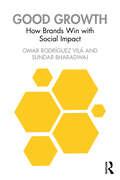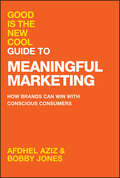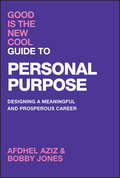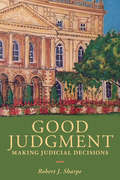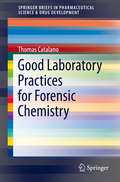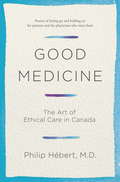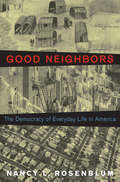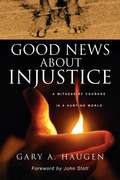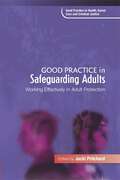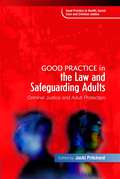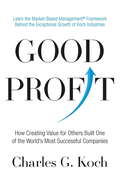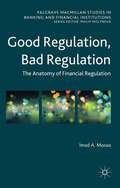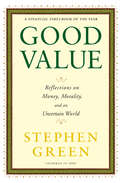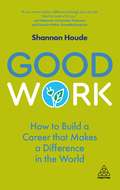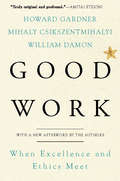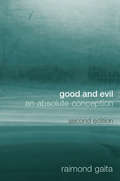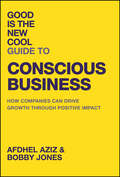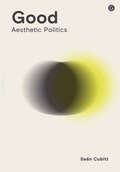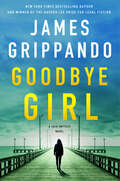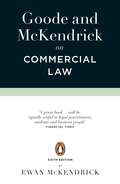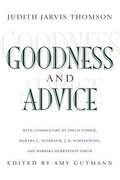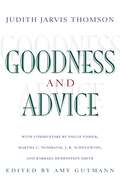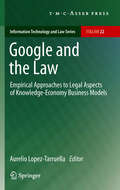- Table View
- List View
Good Growth: How Brands Win with Social Impact
by Omar Rodriguez Vila Sundar BharadwajBusiness has a sustainability problem—and sustainability has a business problem, as many companies are fearful of engaging with social and environmental issues, owing to the costs and risks.Addressing these dual challenges head on, this book provides a blueprint for putting social and environmental benefits at the center of a company’s growth agenda. Many sustainability books offer 30,000-foot strategic views and broad-brush guidance on the business of “doing well by doing good,” but here is a ground-level guide for profitably integrating social and environmental benefits into individual products and brands. The book introduces the rapidly emerging phenomenon of social impact markets and shows how companies can capitalize on these new pockets of consumer demand through focused strategy, data-informed implementation, and a clear eye on the future, including how digital technologies are creating new ways for brands to expand their social impact and make social mission a central element of competitive strategy.Weaving together rich case studies and practical tools, this research-backed and real-world-ready guide fills a critical niche: a hands-on strategy playbook for the executives charged with driving brands’ top-line growth, making it essential reading for C-suite leaders, R&D, product, and brand managers, board members, NGOs, as well as MBA and executive education students.
Good Is the New Cool Guide to Meaningful Marketing: How Brands Can Win with Conscious Consumers
by Bobby Jones Afdhel AzizHow brands can evolve to win with conscious consumers The Good Is the New Cool Guide to Meaningful Marketing is your guide to future-proof your brand with purpose-driven strategies and activations that meet the demands of the new world of conscious capitalism. This book takes readers behind the scenes at some of the world's most famous brands—from purpose-driven pioneers like TOMS, the Honest Company, and Chobani, to household names like Oreo, Call of Duty, and Brand Jordan—to show you how a new wave of marketers are collaborating with values-driven creators of cool like Pharrell, Lady Gaga, and Justin Bieber. In this book, readers will learn about: How brands can authentically discover and deploy their social purpose in ways that drive brand love and financial growth The Seven Steps of Meaningful Marketing, including “Think Citizens Not Consumers,” “Solve Problems from the Everyday to the Epic,” and “People are the New Media” How brands can collaborate with nonprofits to make money and do good at the same time, using examples from Product(RED), Rivet, and Choose Love The Good Is the New Cool Guide to Meaningful Marketing earns a well-deserved spot on the bookshelves of all forward-thinking leaders in business, from startups to Fortune 500 companies, seeking to ride the winds of change and market in a better, more meaningful way.
Good Is the New Cool Guide to Personal Purpose: Designing a Meaningful and Prosperous Career
by Bobby Jones Afdhel AzizHow to Supercharge Your Career with Purpose and Impact At a time when employee engagement has never been lower, the Good Is the New Cool Guide to Personal Purpose: Designing a Meaningful and Prosperous Career helps employees bring their full selves to work by helping them discover and use their personal Purpose to fuel their careers. This can lead to higher levels of physical, emotional, and mental health, as well as huge benefits to organizations in the form of higher levels of engagement, innovation, recruitment, and retention. This book explores the ground-breaking GPS to Purpose framework for finding Personal Purpose, helping readers pinpoint their Gifts, Passions, and how they can be of Service to others, and in the process drive business growth through solving social and environmental problems. With ideas applied at Fortune 500 companies like Adidas, PepsiCo, Microsoft, and others, this book discusses topics including: Explaining what Personal Purpose is in a clear and accessible way Unpacking the many mental, physical, and financial benefits of finding Purpose How to unleash your inner ‘Intrapreneur’ at work How to write an inspiring Living Vision for your life—and your work The Good Is the New Cool Guide to Personal Purpose earns a well-deserved spot on the bookshelves of all employees seeking to design a career that is both meaningful and successful—and help them drive growth in an entrepreneurial way through solving social and environmental problems.
Good Judgment: Making Judicial Decisions
by Robert SharpeGood Judgment, based upon the author's experience as a lawyer, law professor, and judge, explores the role of the judge and the art of judging. Engaging with the American, English, and Commonwealth literature on the role of the judge in the common law tradition, Good Judgment addresses the following questions: What exactly do judges do? What is properly within their role and what falls outside? How do judges approach their decision-making task? In an attempt to explain and reconcile two fundamental features of judging, namely judicial choice and judicial discipline, this book explores the nature and extent of judicial choice in the common law legal tradition and the structural features of that tradition that control and constrain that element of choice. As Sharpe explains, the law does not always provide clear answers, and judges are often left with difficult choices to make, but the power of judicial choice is disciplined and constrained and judges are not free to decide cases according to their own personal sense of justice. Although Good Judgment is accessibly written to appeal to the non-specialist reader with an interest in the judicial process, it also tackles fundamental issues about the nature of law and the role of the judge and will be of particular interest to lawyers, judges, law students, and legal academics.
Good Laboratory Practices for Forensic Chemistry
by Thomas CatalanoGood Laboratory Practices for Forensic Chemistry acknowledges the limitations that often challenge the validity of data and resultant conclusions. Eight chapters examine current practices in analytical chemistry as well as business practices, guidelines and regulations in the pharmaceutical industry to offer improvements to current practices in forensic chemistry. It discusses topics ranging from good manufacturing practices (GMP), good laboratory practices (GLP), the International Conference on Harmonisation (ICH), quality assurance (QA), and quality risk management (QRM), among others. This book is a guide for scientists, professors, and students interested in expanding their knowledge of forensic chemistry.
Good Medicine
by Philip HebertAward-winning physician Philip C. Hébert creates a brave and intimate portrait of the complex ethical imperatives at the heart of good medicine: doctors do not have all the answers; patients must be heard; and their needs, desires, fears, and experiences must be reflected in how practitioners look after them. Medical science continues to advance to previously unimagined heights in its diagnostic and treatment capabilities. With these advances, however, come unexpected ethical dilemmas for practitioners, patients, and families. In Good Medicine, Dr. Hébert approaches these questions of pressing and fundamental importance from the dual point of view of acclaimed physician and long-time patient. With remarkable balance and sensitivity, he explores a range of politically, constitutionally, and ethically contentious matters, including assisted suicide, treatment refusal and suspension, and the overall allocation of medical resources. Hébert pairs his artful analysis with the real-life, often deeply moving stories of those who have lived these challenges. Hébert offers piercing and compassionate insight into the relationship between patients and medical professionals, and guides readers towards the open and empathetic communication needed to ensure good medicine for everyone.From the Hardcover edition.
Good Neighbors: The Democracy of Everyday Life in America
by Nancy L. Rosenblum"Love thy neighbor" is an impossible exhortation. Good neighbors greet us on the street and do small favors, but neighbors also startle us with sounds at night and unleash their demons on us, they monitor and reproach us, and betray us to authorities. The moral principles prescribed for friendship, civil society, and democratic public life apply imperfectly to life around home, where we interact day to day without the formal institutions, rules of conduct, and means of enforcement that guide us in other settings. In Good Neighbors, Nancy Rosenblum explores how encounters among neighbors create a democracy of everyday life, which has been with us since the beginning of American history and is expressed in settler, immigrant, and suburban narratives and in novels, poetry, and popular culture. During disasters, like Hurricane Katrina, the democracy of everyday life is a resource for neighbors who improvise rescue and care. Degraded, this framework can give way to betrayal by neighbors, as faced by the Japanese Americans interned during World War II, or to terrible violence such as the lynching of African Americans. Under extreme conditions the barest act of neighborliness is a bulwark against total ethical breakdown. The elements of the democracy of everyday life--reciprocity, speaking out, and "live and let live"--comprise a democratic ideal not reducible to public principles of justice or civic virtue, but it is no less important. The democracy of everyday life, Rosenblum argues, is the deep substrate of democracy in America and can be its saving remnant.
Good News About Injustice: A Witness of Courage in a Hurting World
by Gary A. HaugenGary Haugen says "the good news about injustice is that God is against it!" Offering his own and others' stories alongside proven, practical strategies, he shows how you too can stand against injustice wherever it occurs.
Good Practice in Safeguarding Adults: Working Effectively in Adult Protection
by Jackie Parker Jacki Pritchard Simon Leslie Alison Bowes Adrian Hayes Adrian Hughes Lucy Naven Marilyn Mornington Sherry Bien Macintosh Seena Fazel Peter Sadler Arwel Owen Jamieson Mornington Deborah Kitson Gary Fitzgerald Ghizala AvanGood Practice in Safeguarding Adults provides an up to date and topical overview of developments in policy, guidance, legislation and practice in the area of adult protection. The book aims to broaden thinking about adult abuse, assesses alternative models of practice such as criminal justice and welfare, and covers groups who may be overlooked, such as people with brain injuries, older prisoners and adults within the black and minority ethnic communities. Issues covered include domestic violence and honour-based crime, abuse in institutions, financial abuse, and risk assessment in adult protection. The book is illustrated throughout with case studies, and also gives a voice to the victims of adult abuse who can be forgotten in a working environment that emphasises target performance, indicators, standards, star ratings, paperwork and correct use of terminology. This book will be essential reading for anyone working with vulnerable adults, including social workers, care managers, care workers, health care staff, police, probation officers, staff within the prison system, advocates, volunteers, training officers and students.
Good Practice in the Law and Safeguarding Adults: Criminal Justice and Adult Protection
by Glyn Hughes Jacki Pritchard Simon Leslie Kathryn Stone David Hewitt Adrian Hughes Marilyn Mornington Peter Sadler Teresa Gorczynska Rob Harris Geraldine Monaghan Alan Noel Carter Mark Pathak Kathryn Mackay Steve Kirkpatrick Penny LettsGood Practice in the Law and Safeguarding Adults provides an up-to-date summary of developments in the legislative framework and best practice relevant to the area of adult protection work. It explains legislation that can be used in adult protection work, covering criminal and civil law, and crucial national guidance such as Achieving Best Evidence. Issues covered include confidentiality and information-sharing in adult protection work, capacity issues, police investigations, financial abuse, advocacy, witness support and honour-based violence. The book is illustrated throughout with case studies and good practice points. This book will be essential reading for anyone working with vulnerable adults, including health and social care workers, care managers, support workers, volunteers, advocates, police, probation staff, prison staff, lawyers training officers and students.
Good Profit: How Creating Value for Others Built One of the World's Most Successful Companies
by Charles G. KochA NEW YORK TIMES BESTSELLERIn 1961, Charles Koch joined his father's Wichita-based company, then valued at $21 million. Six years later, following his father's death, he was named chairman of the board and CEO of Koch Industries, Inc. Today, Koch Industries' estimated worth is $100 billion - making it one of the largest private companies in the world. Koch exceeds the S&P 500's five-decade growth by 27-fold, and plans to double its value on average every six years. What exactly does this company do and why is it so remarkably profitable? While you won't find the Koch name on your stain-resistant carpet, stretch denim jeans, the connectors in your smartphone or your baby's ultra-absorbent diapers, Charles Koch's Market-Based Management® system, intended to generate good profit, drove these innovations and many more. Good profit results from products and services that customers vote for freely with their money; products that help improve people's lives. It results from a culture where employees are empowered to act entrepreneurially to discover customer preferences and the best ways to satisfy them. Good profit is the earnings that follow when long-term value is created for everyone - customers, employees, shareholders and society. Readers will learn to:· Craft a vision for how a business can thrive in spite of disruption and ever-changing consumer values· Find and retain a workforce possessing both virtue and talent (the first being the more important)· Award employees with ownership and decision rights based on their comparative advantages and proven contributions, rather than job title· Motivate all employees to maximise their contributions with effectively structured incentives so employees' compensation is limited only by the value they create - not budgets or company-wide policy A must-read for any leader, entrepreneur or student, as well as those who want a more civil, fair and prosperous society, GOOD PROFIT is destined to rank as one of the greatest management books of all time.
Good Regulation, Bad Regulation
by Imad A. MoosaSince the 2007 2008 global financial crisis, there has been much debate about the role of financial regulation and the causes of financial instability in the industry. Where studies commonly question the value of a regulated rather than free market , this book focuses on the differentiation of 'good regulation' and 'bad regulation'. This book highlights the need for financial regulation to combat corruption, and the integral link that exists between corruption and financial instability. The author evaluates the benefits and shortcomings of specific types of regulation, drawing on recent examples to illustrate each argument. The book presents compelling arguments for the regulation of leverage, liquidity, payday loans and securitisation; and debates the negative aspects of the regulation of short selling, and high-frequency trading, and of Basel-style banking regulation. The author argues that there is no free-market solution to financial instability, and rejects the idea of 'too big to fail'.
Good Value: Reflections on Money, Morality and an Uncertain World
by Stephen GreenCan one be both an ethical person and an effective businessperson? Stephen Green, an ordained priest and the chairman of HSBC, thinks so. In Good Value, Green retraces the history of the global economy and its financial systems, and shows that while the marketplace has delivered huge advantages to humanity, it has also abandoned over a billion people to extreme poverty, encouraged overconsumption and debt, and ravaged the environment.How do we reconcile the demands of capitalism with both the common good and our own spiritual and psychological needs as individuals? To answer that, and some of the most vexing questions of our age, Green takes us on a lively and erudite journey through history, looking for lessons in the work of economists and philosophers, businessmen and poets, theologians and novelists, playwrights and political scientists. An essential business book by a man who is uniquely qualified to write it, Good Value is a timely and persuasive analysis of the most pressing financial and moral questions we face.
Good Work: How to Build a Career that Makes a Difference in the World
by Shannon HoudeDo you want to have a positive impact on the world? Do you want to have a successful career that makes a difference? In short... do you want to do Good Work? Let this step-by-step guide show you how. Packed with useful tools and exercises, this step-by-step guide will help you figure out your passion and purpose, and how to effectively harness it to make real and positive change - on the world, and on your career. Whether you want to battle climate change, promote diversity and inclusion, work in sustainability - or if you're not sure, but just want to leave things a little better at the end of every work day - let this book support you in turning that passion into action. Written by corporate responsibility consultant and certified coach Shannon Houde, this book is part career guide and part job search help - and all purpose-driven. From understanding what the 'purpose economy' is and how you fit into it, to what jobs to go for and how to land them, Good Work is the helping hand you need to make a career out of changing the world.
Good Work: When Excellence and Ethics Meet
by Howard GardnerWhat does it mean to carry out "good work"? What strategies allow people to maintain moral and ethical standards at a time when market forces wield unprecedented power and work life is being radically altered by technological innovation? These are the questions at the heart of this important collaboration by three leaders in psychology. Enlivened with stories of real people facing hard decisions, Good Work offers powerful insight into one of the most important issues of our time and, indeed, into the future course of science, technology, and communication.
Good and Evil: An Absolute Conception
by Raimond GaitaRaimond Gaita's Good and Evil is one of the most important, original and provocative books on the nature of morality to have been published in recent years. It is essential reading for anyone interested in what it means to talk about good and evil. Gaita argues that questions about morality are inseparable from the preciousness of each human being, an issue we can only address if we place the idea of remorse at the centre of moral life. Drawing on an astonishing range of thinkers and writers, including Plato, Wittgenstein, George Orwell and Primo Levi, Gaita also reflects on the place of reason and truth in morality and ultimately how questions about good and evil are connected to the meaning of our lives.This revised edition of Good and Evil includes a substantial new preface and afterword by the author.
Good is the New Cool Guide to Conscious Business: How Companies Can Drive Growth Through Positive Impact
by Bobby Jones Afdhel AzizHow brands can evolve to win with conscious consumers In the Good is the New Cool Guide to Conscious Business: How Companies Can Drive Growth Through Positive Impact, conscious capitalism experts Afdhel Aziz and Bobby Jones deliver all of the knowledge and tools needed to discover, design, and deploy sustainable and inclusive growth within any organization. This book draws on stories, insights, and case studies from leaders at successful purpose-driven corporations around the world, from Fortune 500 giants like Unilever and Procter to tech disruptors like Tesla, Microsoft, and Airbnb, as well as beloved brands like Lego, Adidas, and Patagonia. In the last decade, corporations were required to meet the digital age's challenges and opportunities. Today, corporations must meet the purpose-based demands of consumers, employees, and investors—or get left behind. In this book, readers will learn about: The seven qualities of an inspiring and motivating purpose statement Harnessing nine principles of purpose, including “Purpose doesn't have to be political,” “Purpose is about putting your money where your mission is,” and “Purpose is about measuring what you treasure” Understanding the rise of impact investors and measuring the ROI of purpose-based corporate initiatives Thought-provoking, accessible, and inspiring, the Good Is the New Cool Guide to Conscious Business earns a well-deserved spot on the bookshelves of all C-suite business leaders seeking a new vision to transform their organizations, and the world, for the better.
Good: Aesthetic Politics
by Sean CubittWhat is the good life—for me, for us, for the cosmos?Good is an ecocritical enquiry into ethical and political dimensions of aesthetics. Following Aristotle&’s lead, it starts with ethics as the question concerning what is the good life for me, moving on to politics as the good life for us. Like Aristotle, between ethics and politics it inserts the question of the good life for you and me—the question of love. In the end—which is where we all live today—it goes beyond Aristotle&’s human-centred approach, insisting that the good life cannot be thought or lived without including technologies and ecologies. A truly cosmopolitan politics is a politics of the cosmos. Learning from indigenous cultures, it speaks from and with nature and machines in the form of gods and ancestors. Packed with examples from banking apps to cave art, economic manifestos to cookery, passing through music, painting, poetry, and film, the book evokes critical traditions from across the world to present a lucid and accessible case for decolonial and ecocritical aesthetics.
Goodbye Girl: A Jack Swyteck Novel (Jack Swyteck Novel #18)
by James GrippandoA contentious intellectual piracy case leads to an unsolved murder, and Jack Swyteck’s client—a pop music icon—is the accused killer. Piracy costs the movie and music industry billions. No one has been able to stop it. But that won’t stop Miami criminal defense lawyer Jack Swyteck. His latest client, Imani Nichols, is a Grammy-winning popstar whose career has skyrocketed. Despite her success, she’s the most underpaid superstar on the planet because of an onerous record contract she signed as a teenager with her now ex-husband Shaky Nichols, who has made himself rich off her royalties. Preferring to see thieves profit from her music than let her ex-husband pocket one more dime, Imani takes to social media and tells her millions of fans to “go pirate” and download her music illegally. Her hardball tactic leads to scorched-earth litigation, and now she needs Jack’s help. The case takes a deadly turn when salacious allegations of infidelity send Imani and Shaky down a path of mutual assured destruction, each implicating the other in the unsolved murder of Imani’s extra-marital lover twelve years ago. Tyler McCormick died of asphyxiation, and his body was found in Biscayne Bay, chained to a piling with the words "goodbye girl" impressed on his chest. Despite their fierce denials, Imani and Shakey are both indicted for murder, leading to a sensational trial that exposes shocking secrets about their failed marriage, their cut-throat business partnership, and Imani’s astonishing success. Yet as Jack discovers, uncovering the truth about the killing and the cryptic “goodbye girl” won’t just exonerate or convict his client, her ex, and their music empire. It may shape the future of the entire recording industry.
Goodbye Religion: The Causes and Consequences of Secularization (Secular Studies)
by Ryan T. Cragun Jesse M. SmithExamines why so many are leaving religion, and what that means for American society One of the largest changes in American culture over the last fifty years has been the increase in people exiting religion. Goodbye Religion explores why there has been such an upswing among those who identify as nonreligious, and what the societal implications are of this move towards less religiosity. Utilizing nationally representative data and more than a hundred in-depth interviews with people who leave their religion behind, Ryan T. Cragun and Jesse M. Smith examine the variety of social, psychological, and environmental conditions behind the exiting process, as well as what people do with the time they used to devote to religious observance. They show that for most people who leave, abandoning religion is not a crisis, and does not generally disrupt their health, charitable giving, or volunteering. Drawing on the data, Cragun and Smith argue that the fears among some that massive religious exit will result in a decline in family values or less civic engagement are unfounded, and that those who become nonreligious remain engaged in society and continue to strive to make the world a better place. At a time where more and more individuals are questioning the implications of our increasingly secular society, Goodbye Religion offers an engaging and fascinating analysis into what religious exiting—and secularization broadly—means for American society.
Goode and McKendrick on Commercial Law: 6th Edition
by Ewan McKendrick Roy GoodeThe sixth edition of the authoritative and acclaimed commercial law text'A great book ... will be equally useful to legal practitioners, students and business people' Financial Times This sixth edition of Goode on Commercial Law, now retitled Goode and McKendrick on Commercial Law, remains the first port of call for the modern day practitioner with its theoretical and practical coverage of commercial law in both a national and an international context. Now updated to cover the most recent legal and technical changes, this highly acclaimed and authoritative text, which is regularly cited by all courts from the Supreme Court downwards, combines a deep theoretical analysis of foundational principles with a practical approach in the context of typical commercial and financial transactions. It is also replete with diagrams and specimen forms covering a wide range of transactions.'Searching analysis and meticulous exposition coupled with a lucid clarity of style and a relaxed lightness of touch combine to make the book not only compulsory but compulsive reading for anyone interested in its field' Law Quarterly Review'A work of immense scholarship ... Professor Goode's work must be as nearly exhaustive as can be possible and as produced by Penguin is a triumph of paperback publishing' Solicitor's Journal'Clear and comprehensive ... The student and practitioner will find it indispensable; the interested layperson too will benefit from it as a work of reference' British Business'A veritable tour de force' Business Law Review
Goodness & Advice
by Judith Jarvis ThomsonHow should we live? What do we owe to other people? In Goodness and Advice, the eminent philosopher Judith Jarvis Thomson explores how we should go about answering such fundamental questions. In doing so, she makes major advances in moral philosophy, pointing to some deep problems for influential moral theories and describing the structure of a new and much more promising theory. Thomson begins by lamenting the prevalence of the idea that there is an unbridgeable gap between fact and value--that to say something is good, for example, is not to state a fact, but to do something more like expressing an attitude or feeling. She sets out to challenge this view, first by assessing the apparently powerful claims of Consequentialism. Thomson makes the striking argument that this familiar theory must ultimately fail because its basic requirement--that people should act to bring about the "most good"--is meaningless. It rests on an incoherent conception of goodness, and supplies, not mistaken advice, but no advice at all. Thomson then outlines the theory that she thinks we should opt for instead. This theory says that no acts are, simply, good: an act can at most be good in one or another way--as, for example, good for Smith or for Jones. What we ought to do is, most importantly, to avoid injustice; and whether an act is unjust is a function both of the rights of those affected, including the agent, and of how good or bad the act is for them. The book, which originated in the Tanner lectures that Thomson delivered at Princeton University's Center for Human Values in 1999, includes two chapters by Thomson ("Goodness" and "Advice"), provocative comments by four prominent scholars--Martha Nussbaum, Jerome Schneewind, Philip Fisher, and Barbara Herrnstein Smith--and replies by Thomson to those comments.
Goodness and Advice (The University Center for Human Values Series #25)
by Judith Jarvis ThomsonHow should we live? What do we owe to other people? In Goodness and Advice, the eminent philosopher Judith Jarvis Thomson explores how we should go about answering such fundamental questions. In doing so, she makes major advances in moral philosophy, pointing to some deep problems for influential moral theories and describing the structure of a new and much more promising theory. Thomson begins by lamenting the prevalence of the idea that there is an unbridgeable gap between fact and value--that to say something is good, for example, is not to state a fact, but to do something more like expressing an attitude or feeling. She sets out to challenge this view, first by assessing the apparently powerful claims of Consequentialism. Thomson makes the striking argument that this familiar theory must ultimately fail because its basic requirement--that people should act to bring about the "most good"--is meaningless. It rests on an incoherent conception of goodness, and supplies, not mistaken advice, but no advice at all. Thomson then outlines the theory that she thinks we should opt for instead. This theory says that no acts are, simply, good: an act can at most be good in one or another way--as, for example, good for Smith or for Jones. What we ought to do is, most importantly, to avoid injustice; and whether an act is unjust is a function both of the rights of those affected, including the agent, and of how good or bad the act is for them. The book, which originated in the Tanner lectures that Thomson delivered at Princeton University's Center for Human Values in 1999, includes two chapters by Thomson ("Goodness" and "Advice"), provocative comments by four prominent scholars--Martha Nussbaum, Jerome Schneewind, Philip Fisher, and Barbara Herrnstein Smith--and replies by Thomson to those comments.
Google and the Law
by Aurelio Lopez-TarruellaGoogle's has proved to be one of the most successful business models in today's knowledge economy. Its services and applications have become part of our day-to-day life. However, Google has repeatedly been accused of acting outside the law in the development of services such as Adwords, Googlebooks or YouTube. One of the main purposes of this book is to assess whether those accusations are well-founded. But more important than that, this book provides a deeper reflection: are current legal systems adapted to business models such as that of Google or are they conceived for an industrial economy? Do the various lawsuits involving Google show an evolution of the existing legal framework that might favour the flourishing of other knowledge-economy businesses? Or do they simply reflect that Google has gone too far? What lessons can other knowledge-based businesses learn from all the disputes in which Google has been or is involved? This book is valuable reading for legal practitioners and academics in the field of information technologies and intellectual property law, economists interested in knowledge-economy business models and sociologists interested in internet and social networks. Dr. Aurelio Lopez-Tarruella is Senior Lecturer in Private International Law at the University of Alicante, Spain.
Google for Lawyers: Essential Search Tips and Productivity Tools
by Carole A. Levitt Mark E. RoschLevitt, an attorney and former law librarian and Rosch, an attorney who runs a website for lawyers doing Internet research, detail how lawyers can use free and low-cost tools available through Google to compete with large firms and their large research and technology budgets. They explain how to use Google Scholar's case law database, Gmail, advertising, and the Google applications: Docs, News, Groups, Images, Blogs, Finance, Books, Chrome, Knol, Maps, Desktop Search, Calendar, Voice, Wave, Analytics, Translate, and other programs for basic and advanced research and office use. They include tips for searching case law and articles; locating information about the opposition, expert witnesses and jurors, and clients; and finding missing witnesses and heirs. Screen shots are included. Annotation ©2010 Book News, Inc. , Portland, OR (booknews. com)
